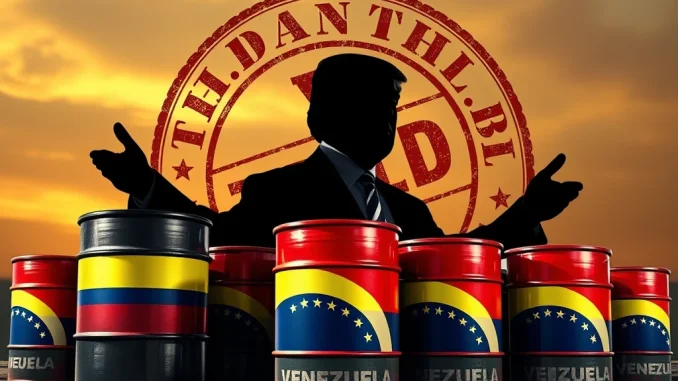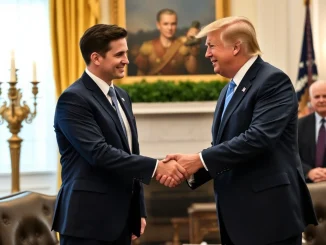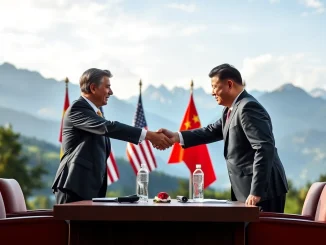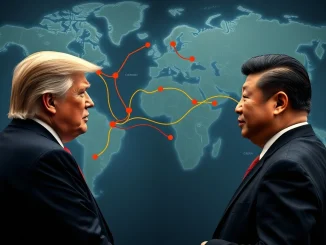
In a stunning development that has sent ripples through global energy markets, former U.S. President Donald Trump has once again taken center stage, this time threatening to impose a hefty 25% tariff on any nation daring to purchase oil or gas from Venezuela. This news, initially reported by financial news X account Walter Bloomberg, has ignited discussions and concerns across the globe. But what does this mean for the already volatile energy sector, and how might it impact international relations? Let’s dive into the details of this Venezuela oil tariff threat and explore its potential ramifications.
Why is Trump Threatening a 25% Venezuela Oil Tariff?
Donald Trump’s threat to impose a Venezuela oil tariff isn’t entirely out of the blue. Venezuela, under the leadership of Nicolás Maduro, has been under U.S. sanctions for years, primarily due to concerns over human rights, democratic backsliding, and corruption. These sanctions have significantly impacted Venezuela’s oil industry, which is the backbone of its economy. By threatening a 25% tariff, Trump is aiming to further isolate the Maduro regime and cut off a crucial revenue stream. Here’s a breakdown of the key reasons behind this move:
- Continuing Pressure on Maduro: The U.S. has long sought to pressure Nicolás Maduro to step down and allow for free and fair elections. Economic sanctions, including those targeting the oil sector, have been a primary tool in this strategy.
- Deterring International Support for Venezuela: By imposing tariffs on countries that buy Venezuelan oil and gas, the U.S. aims to discourage other nations from supporting Maduro’s government financially.
- Domestic Political Considerations: Taking a tough stance against Venezuela can resonate with certain segments of the U.S. electorate, projecting an image of strength and resolve on the international stage.
- Energy Security Concerns (Potentially): While seemingly counterintuitive, in the long run, the U.S. might aim to reshape global energy flows and reduce reliance on specific nations, although this is a less direct and perhaps unintended consequence in this scenario.
How Would a 25% Tariff on Venezuela Oil Impact Energy Markets?
A 25% tariff on Venezuela oil tariff and gas could have significant repercussions for global energy markets. Venezuela, despite its economic woes, still holds some of the world’s largest proven oil reserves. Here’s a look at the potential impacts:
- Price Volatility: Reduced supply from Venezuela, coupled with tariffs making Venezuelan oil more expensive, could lead to increased volatility in global oil prices. This could translate to higher prices at the pump for consumers worldwide.
- Shift in Trade Flows: Countries that currently import Venezuelan oil might be forced to seek alternative sources, potentially leading to shifts in global trade flows. This could benefit other oil-producing nations but disrupt existing supply chains.
- Impact on Venezuela’s Economy: For Venezuela, this tariff would be another devastating blow to its already crippled economy. Reduced oil revenues would exacerbate economic hardship and potentially fuel further instability.
- Geopolitical Tensions: The move could escalate geopolitical tensions, particularly with countries that rely on Venezuelan oil or view the tariff as an overreach of U.S. influence.
| Impact Area | Potential Consequence |
|---|---|
| Global Oil Prices | Increased Volatility, Potential Price Hikes |
| Venezuelan Economy | Further Economic Hardship, Reduced Revenue |
| International Trade | Shifts in Trade Flows, Supply Chain Disruptions |
| Geopolitics | Increased Tensions, Strain on International Relations |
What are the Broader Implications of Trump’s Trump Tariff Threat?
Beyond the immediate impact on energy markets, Trump’s Trump tariff threat on Venezuelan oil raises several broader questions about international trade, U.S. foreign policy, and the use of economic sanctions as a tool of diplomacy.
- Unilateralism vs. Multilateralism: This action reflects a tendency towards unilateralism in U.S. foreign policy, where decisions are made and actions are taken without broad international consensus. This approach can strain relationships with allies and international organizations.
- Effectiveness of Sanctions: The effectiveness of sanctions as a tool to achieve political change is often debated. While sanctions can inflict economic pain, they don’t always lead to the desired political outcomes and can sometimes harm civilian populations.
- Precedent Setting: Imposing tariffs as a tool to influence the energy trade sets a precedent that could be followed by other nations in different contexts, potentially leading to a more fragmented and protectionist global trading system.
- Global Economic Sanctions Landscape: This action further complicates the already intricate web of global sanctions and trade restrictions. Businesses and countries operating internationally need to navigate an increasingly complex regulatory environment.
How Might This Affect Global Trade Dynamics?
The potential Venezuela oil tariff is not just about oil; it’s about the intricate web of global trade and the rules that govern it. Here’s how this could reshape trade dynamics:
- Increased Trade Tensions: Imposing tariffs unilaterally can provoke retaliatory measures from other countries, leading to trade wars and increased tensions. This can disrupt global supply chains and harm economic growth.
- Redefining Trade Relationships: Countries might reconsider their trade relationships and seek to diversify their sources of supply to reduce dependence on nations prone to using tariffs as a political tool.
- Challenges to the WTO: Unilateral tariff actions can undermine the authority and effectiveness of the World Trade Organization (WTO), which is designed to promote rules-based international trade.
- Regional Trade Blocs: In response to global trade tensions, we might see a strengthening of regional trade blocs as countries seek closer economic ties with their neighbors.
Actionable Insights: What Should Businesses and Investors Watch For?
For businesses and investors, particularly those in the energy, shipping, and finance sectors, Trump’s Venezuela oil tariff threat is a significant development that requires careful monitoring. Here are some actionable insights:
- Monitor Oil Prices Closely: Keep a close watch on global oil price movements, as tariffs could contribute to increased volatility.
- Assess Supply Chain Risks: Businesses reliant on Venezuelan oil or gas in their supply chains should assess potential disruptions and explore alternative sourcing options.
- Geopolitical Risk Assessment: Factor geopolitical risks into investment decisions, particularly in regions affected by U.S. sanctions policies.
- Regulatory Compliance: Stay informed about evolving sanctions and trade regulations to ensure compliance and mitigate risks.
Conclusion: Navigating the Uncertainties of Venezuela Oil Tariff
Donald Trump’s threat to impose a 25% tariff on countries buying oil and gas from Venezuela injects a fresh dose of uncertainty into global energy markets and international relations. While the full impact remains to be seen, this move underscores the continued use of economic sanctions as a tool of U.S. foreign policy and highlights the fragility of global trade dynamics. For businesses, investors, and policymakers, understanding and navigating these complexities is crucial in an era of increasing geopolitical and economic volatility. The situation surrounding the Venezuela oil tariff is a stark reminder of how quickly global landscapes can shift, demanding adaptability and strategic foresight in an interconnected world.



